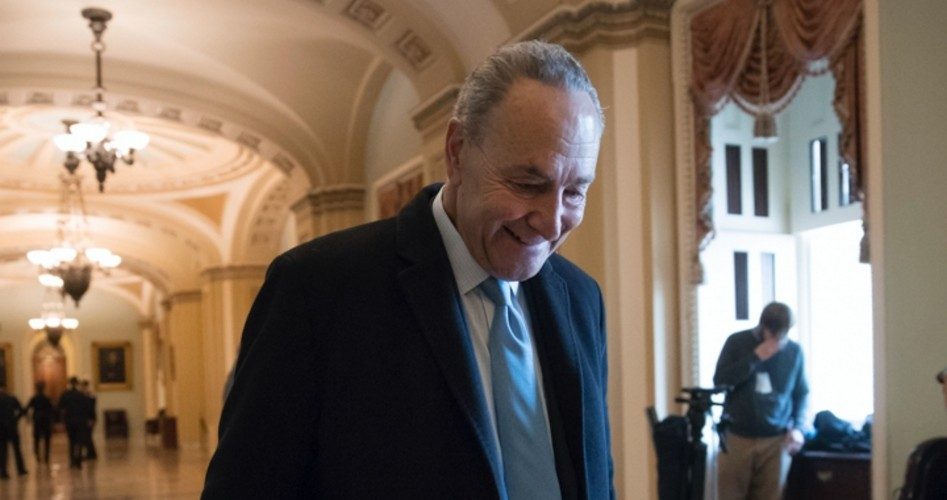
Democrats made a bold effort to force the White House to accept amnesty for DACA “Dreamers,” but Trump refused to give in.
Responding to the news Monday that the Democrats had opted to vote to provide funding to the government — and end the so-called government shutdown — President Donald Trump issued a statement, read to the press by Sarah Huckabee Sanders. “I am pleased that Democrats in Congress have come to their senses and are now willing to fund our great military, border patrol, first responders and insurance for valuable children.”
Trump added, “As I’ve always said, once the government is funded my administration will work toward solving the problem of very unfair illegal immigration.”
Sending the Democrats a message — and also far too many Republicans — Trump said, “We’ll make a long-term deal on immigration if, and only if, it’s good for our country.” (Emphasis added.)
{modulepos inner_text_ad}
Apparently, the Democrat’s ploy of insisting on a permanent “deal” legalizing the “dreamers” — illegal aliens who were brought into the country by their parents — in exchange for their votes to keep the government from “shutting down,” was hurting the Democrats’ chances for the 2018 off-year congressional elections. As Selwyn Duke wrote on Sunday, the Democrats have good reason to care deeply about DACA, considering “upwards of 80 percent of these illegals would vote Democrat after naturalization.” But they now have an immediate concern about 2018.
A new poll by Harvard-Harris revealed that the demand by Senate Minority Leader Chuck Schumer (D-N.Y.; shown), tying Democrat votes to fund the government to the legalization of thousands of illegal immigrants, was very unpopular. When asked, “Would you favor or oppose Democrats voting to shut the government down if the continuing budget resolution does not include restoring so-called DACA work permits for undocumented immigrants brought here illegally by their parents?” 58 percent said they were opposed.
Additional polling data was also unfavorable for the Democrats. Solid majorities evidently support Trump’s position of ending the Diversity Visa Lottery program, building a border wall, and halting chain migration.
In the end, Democrats buckled, and the Senate voted 81-18 to fund the government. But Senator Schumer claimed that he had extracted a promise from Senate Majority Leader Mitch McConnell (R-Ky.) that the “Dreamer” issue would be addressed. The temporary funding bill runs out in 17 days, so we could be back here again in less than three weeks.
But even if McConnell did promise to force a vote on DACA in the Senate, he has less sway over what action, if any, the House of Representatives might take. And, even if a DACA bill passed both houses, it would still have to get the approval of President Trump.
And the Trump White House issued a statement indicating that it is unlikely the president would agree to a bill that Schumer would sign off on: “Rather than address these three essential priorities, the Flake-Graham-Durbin proposal fails to enshrine into law these baseline immigration reforms [ending chain migration, the Diversity Visa Lottery, and building the border wall], which were deemed necessary and essential by the very people responsible for enforcing and administering our immigration system every day.”
In the past, Democrats have generally won, with the help of the compliant liberal media, the public relations battle over government shutdowns. The mainstream media did try to help out their fellow liberals in the Democratic Party this time, as well, but Trump opted to take the offensive and shift the blame to the Democrats. In the past, Republicans have generally been the ones to “blink,” not wanting to be blamed for shutting down the government, but this time the Democrats were losing the public relations battle.
In a 1996 article, reprinted recently by the Mises Institute, Lew Rockwell (who has also been a contributor to The New American), took a contrarian view on the whole concept of a shutdown by the federal government. “Shutting down the government was this Congress’ most noble act,” Rockwell said, in reference to a government shutdown back then.
Rockwell argued that government shutdowns are a “fiscal illusion,” noting that “government could have reopened, and run based on present receipts. That way the budget would be immediately balanced.”
Rockwell’s 1996 article, in remarks that could have been written about every other “shutdown,” including the present one, asked the readers to, “Consider what is known as the ‘Washington Monument Ploy.’ When budget cuts are threatened, visiting hours at popular monuments are cut back.” The media then interviews disappointed tourists who are turned away. “Average people tell the reporter, ‘my family and I came all the way from Sacramento, but because of political bickering, our vacation has been ruined.’”
Interestingly, the Chinese state’s “news” service Xinhua “mocked the United States” for the current shutdown, according to Ryan McMaken of Mises. The Chinese told its readers that the current legislative stalemate demonstrates “chronic flaws” in the U.S. federal political system. In other words, the Chinese communists view the “gridlock” in the American political system as a bad thing. Of course, totalitarian governments do not have to deal with “gridlock.” Mao, Hitler, Stalin, and Castro were always able to get things done.
In the end, these periodic government “shutdowns” could be avoided in one of several ways. First of all, if Congress would simply vote on each agency’s budget individually, we would not have to contend with these failures to fund the Washington Monument also failing to fund the U.S. military. Secondly, if the federal government would submit balanced budgets, not by raising taxes, but by eliminating unconstitutional programs, there would be plenty of money available for legitimate purposes.
For example, if the Department of Education (which is not found in the enumerated powers of the Constitution) were eliminated, that would free up money for other programs. It did not even exist until the 1970s, when President Jimmy Carter paid off the National Education Association for its support in his presidential run.
Photo of Sen. Chuck Schumer: AP Images



